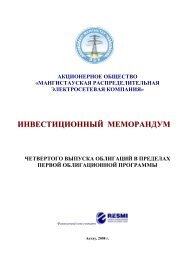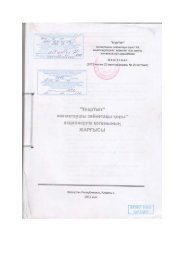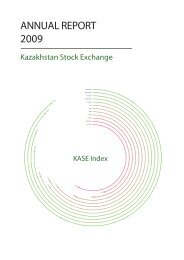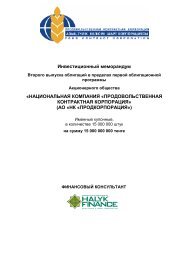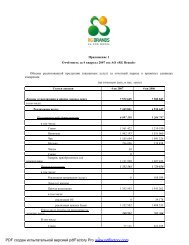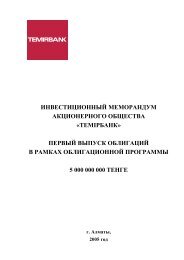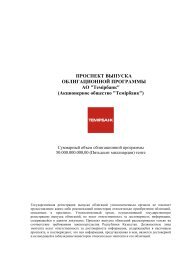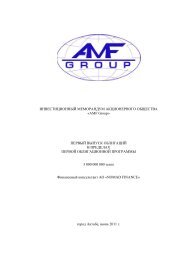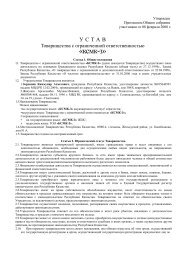JPMorgan - KASE
JPMorgan - KASE
JPMorgan - KASE
You also want an ePaper? Increase the reach of your titles
YUMPU automatically turns print PDFs into web optimized ePapers that Google loves.
Certain Tax Considerations<br />
Certain U.S. Federal Income Tax Considerations<br />
The following discussion is a summary of the principal U.S. federal income tax consequences of<br />
the ownership and disposition of the notes to a U.S. holder (as defined below) who purchases<br />
notes pursuant to this offering at the price set forth on the cover page. This discussion is based<br />
upon existing U.S. federal income tax law, including the Internal Revenue Code of 1986, as<br />
amended (the “Internal Revenue Code”), administrative pronouncements, judicial decisions and<br />
Treasury Regulations, as in effect as of the date hereof, all of which are subject to change,<br />
possibly with retroactive effect.<br />
This summary assumes that each of the notes are held as a capital asset as defined in Section<br />
1221 of the Internal Revenue Code, in the hands of U.S. holders at all relevant times. This<br />
summary does not discuss all aspects of U.S. federal income taxation that may be applicable to<br />
holders of notes, nor does it address any aspects of foreign, state or local taxation. Furthermore,<br />
this summary does not discuss all the tax consequences that may be relevant to a U.S. holder in<br />
light of such holder’s particular circumstances, nor to U.S. holders subject to special rules<br />
including certain financial institutions, regulated investment companies, insurance companies,<br />
dealers in securities or currencies, tax-exempt organizations, persons who hold notes as part of a<br />
position in a “straddle” or “appreciated financial position” or as part of a “hedging” or<br />
“conversion” transaction or other integrated transaction, persons engaged in a trade or business<br />
in the U.S. or persons who have ceased to be U.S. citizens or to be taxed as resident aliens, and<br />
U.S. holders whose functional currency is not the U.S. dollar.<br />
As used herein, “U.S. holder” means a holder of notes who or that is for U.S. federal income tax<br />
purposes (i) a citizen or resident of the United States, (ii) a corporation or other entity taxable as<br />
a corporation organized under the laws of the United States or any political subdivision thereof<br />
(including the States and the District of Columbia), (iii) an estate the income of which is subject<br />
to U.S. federal income taxation regardless of its source, (iv) a trust if a court within the U.S. is<br />
able to exercise primary jurisdiction over its administration and one or more U.S. persons have<br />
authority to control all substantial decisions of the trust, or (v) any other person that is subject to<br />
U.S. federal income tax on its worldwide income. This summary does not discuss any U.S. federal<br />
income tax consequences to holders that are not U.S. holders.<br />
The following discussion is for general information only and is not intended to be, nor should it<br />
be construed to be, legal or tax advice to any holder or prospective holder of notes and no<br />
opinion or representation with respect to the U.S. federal income tax consequences to any such<br />
holder or prospective holder is made. Holders of notes are urged to consult their tax advisors<br />
with respect to the U.S. federal, state and local tax consequences, the foreign tax consequences<br />
and the non-tax consequences of the acquisition, ownership and disposition of notes.<br />
Payment of Interest<br />
Interest paid on a note generally will be taxable to a U.S. holder as ordinary interest income at<br />
the time it accrues or is received in accordance with the U.S. holder’s method of accounting for<br />
U.S. federal income tax purposes. In addition to interest on the notes, a U.S. holder will be<br />
required to include in income any additional amounts and certain foreign taxes withheld from<br />
interest payments, notwithstanding that the U.S. holder does not in fact receive such withheld<br />
taxes. A U.S. holder may be entitled to deduct or credit withholding tax withheld by the issuer<br />
and paid over to the applicable taxing authorities or for any of those taxes paid directly to the<br />
applicable taxing authorities, subject to applicable limitations in the Internal Revenue Code. The<br />
rules governing the foreign tax credit are complex. Potential holders are urged to consult their<br />
tax advisors regarding the availability of the foreign tax credit in their particular circumstances.<br />
Interest income on a note generally will constitute foreign source income and generally will be<br />
considered “passive” income or “financial services” income (or, if withholding tax at a rate of 5%<br />
or more were to be imposed, as “high withholding tax interest”), which are treated separately<br />
from other types of income in computing the foreign tax credit allowable to U.S. holders under<br />
the Internal Revenue Code.<br />
140




